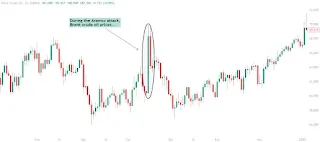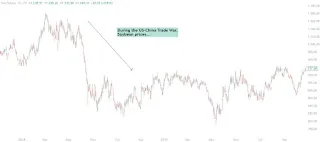Dear Friends, if we find a way to grow money, that is, to make money from money, we will escape the rat race in the future and achieve financial freedom. To realize this dream, many people are turning to trading in financial markets. These platforms, where assets such as cryptocurrency, stocks, bonds, foreign exchange, and commodities are bought and sold, offer us unlimited opportunities. No matter where we live in the world, we can access financial markets and achieve our goals through profitable trading. If we have good knowledge of technical analysis and fundamental analysis, we can more easily understand the secrets of financial trading. In this article, we will discuss the impact of geopolitical tensions on financial markets as part of fundamental analysis.
Geopolitical tensions can have complex and diverse effects on financial markets. These effects can vary depending on the nature, location, and duration of the tension. Geopolitical tensions create uncertainty in financial markets, leading to increased volatility. This atmosphere of unrest can cause traders and investors to act more cautiously. Consequently, this can result in a decline in investments and trading, negatively impacting economic growth. Geopolitical tensions can affect some sectors more than others. For instance, during a war, the defense and aerospace sectors may rise, while the tourism and travel sectors may decline. These tensions can lead to a decrease in stock values, while causing an increase in bond yields and the prices of safe-haven assets like gold. Now, let's review this with examples.
Aramco Attack (2019)
The effects of geopolitical tensions on commodity prices are more pronounced. Geopolitical tensions in regions that could impact energy supply can drive up oil and natural gas prices. Let's take a brief look at the Aramco attack as an example.
On September 14, 2019, drone and missile attacks were carried out on the Abqaiq and Khurais oil facilities belonging to Aramco in Saudi Arabia. This attack temporarily disabled approximately 50% of Saudi Arabia's oil production capacity and 5% of global oil production. Immediately following the attack, Brent oil prices surged by more than 20%, reaching up to $72 per barrel. This was one of the largest single-day increases in oil prices in recent years. The prices of the U.S. West Texas Intermediate (WTI) crude oil also showed a similar increase. You can view example charts below:
 |
| Brent crude prices during Aramco Attack |
 |
| WTI crude prices during Aramco Attack |
Following the attack, there was an increase in the shares of energy companies, particularly those involved in oil production and refining. The shares of major oil companies such as ExxonMobil, Chevron, and BP gained value. Additionally, investors turned to gold, seen as a safe haven, due to the uncertainty and rising geopolitical risks. There was a noticeable increase in gold prices. The attack had a negative impact on the currencies of many countries. Currencies of countries dependent on oil imports lost value due to increased energy costs. There was a decline observed, especially in currencies like the Indian rupee and the Turkish lira.
The Aramco attack is a strong example of the broad and sudden impact of geopolitical tensions on financial markets. Such events demonstrate how fragile global markets can be and how geopolitical developments can have profound effects on financial instruments.
Russia-Ukraine War
The Russia-Ukraine crisis that erupted in 2022 had a deep and widespread impact on the global economy and financial markets. The war led to significant increases in energy and food prices, declines in stock prices, rises in gold prices, and serious disruptions in global supply chains. This situation increased inflation in many countries, slowed down economic growth, and created uncertainty among investors. Russia is one of the world's largest exporters of oil and natural gas. With the onset of the war, Western countries began imposing sanctions on Russia. These sanctions drastically reduced energy exports from Russia and led to a sharp increase in global energy prices. Both oil and natural gas prices increased substantially, reaching record levels in Europe. Please refer to the Natural Gas chart below:
 |
| Natural Gas prices hit record highs in Europe due to the war. |
Russia's invasion of Ukraine led to sharp declines in global stock markets. European exchanges experienced huge losses. However, due to the search for safe havens, gold prices rose. There was a noticeable increase in gold prices with the onset of the war. Gold prices rose from $1,800 per ounce to $2,000 in 2022. An example chart is provided below:
 |
| Gold as a safe haven during Russia-Ukraine War |
The long-term effects of the Russia-Ukraine war on the global economy and financial markets remain uncertain. The timing of the war's conclusion and its outcome create substantial uncertainty in determining future economic conditions. This situation is leading traders and investors to be cautious and to evaluate risks carefully.
The US-China Trade War (2018-2019)
The trade war between the US and China, which began in 2018, dealt a heavy blow to the global economy. The trade war negatively impacted not only the economies of the two countries involved but also the global economy. The United States and China, two major players in the global economy, stand out and their trade constitutes a large portion of world trade. However, with the onset of the trade war, both countries began imposing tariffs on each other. This situation led to price increases in many products and a sharp decrease in trade volume.
The impact of the US-China Trade War extended to the currency markets as well. The Chinese yuan depreciated against the US dollar, while the US dollar strengthened against other major currencies. An example graph is presented below:
 |
| Yuan falls against USD due to trade war. |
The prices of many agricultural products were also affected by the Trade War. China's restriction on importing agricultural products from the US led to a decrease in prices for commodities such as soybeans. An example is presented in the graph below:
 |
| US-China Trade War effects on Soybean prices |
The impact of the Trade War was also felt in the stock market. Trade tensions between the US and China negatively affected stocks, particularly in the technology and manufacturing sectors. The NASDAQ and Dow Jones Indices experienced wide fluctuations.
These examples illustrate the broad impact of geopolitical tensions on financial markets. Each event can affect different sectors and asset classes in various ways. The energy sector is often more affected by geopolitical tensions. This is because energy supply and prices are highly sensitive to such developments. Similarly, the defense industry and other security-related sectors can be similarly affected. Conversely, asset classes considered safe havens, such as gold and secure government bonds, may experience demand when geopolitical risks escalate. As a result, the impact of geopolitical tensions on financial markets is multifaceted and should be analyzed considering the unique conditions and environmental factors of each event. It is important for all of us to understand market volatility during such periods and develop appropriate strategies accordingly.
Keep in mind: Financial markets are great platforms for increasing income. However, acting in a novice manner can result in losses. When trading, relying solely on technical analysis may not be sufficient. Integrating fundamental analysis with technical analysis can lead to achieving expected results more reliably.